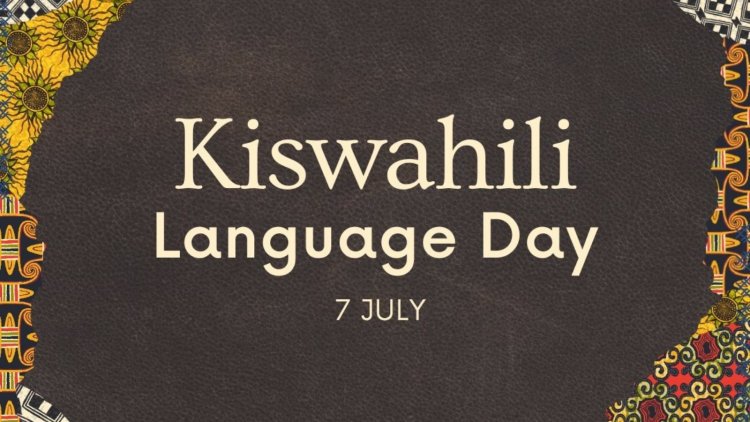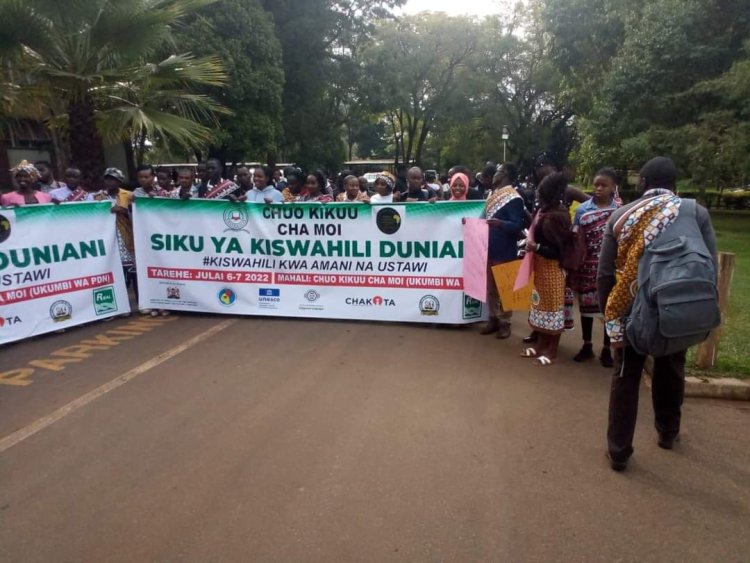Inside First World Kiswahili Day
Tourism and Wildlife Cabinet Secretary Najib Balala led Kenyans in celebrating the day dedicated to the language spoken by

If you had no idea that there is the World Kiswahili Language Day 2022 celebrated every July 7, now you do.
Tourism and Wildlife Cabinet Secretary Najib Balala led Kenyans in celebrating the day dedicated to the language spoken by over 200 million people across the world.
Balala led the National Steering Committee of the World Kiswahili Language Day 2022 in hosting the day from 10 am at the Kenyatta International Convention Centre (KICC) to create awareness of Kiswahili being the first officially recognized African Language by the United Nations Educational, Scientific and Cultural Organization (UNESCO).
Nawatakia kila la heri siku ya kuzungumza Kiswahili. #SikuYaKiswahili pic.twitter.com/lH4H3CCKAS — Hon. Najib Balala (@tunajibu) July 7, 2022
The CS will later host an event to celebrate World Kiswahili Day at the National Museums of Kenya.
"Today is a historic day because UNESCO member states declared 7th July as world Swahili day, this is our pride because our African language has been acknowledged by the United Nations," Balala said in a video message shared on his social media platforms.
Balala also celebrated the Kiswahili language stating that it is a mixture of languages from different fields of different countries.
The annual celebration is coincidentally celebrated alongside the famous 'Saba Saba' day, which stemmed from the movement on July 7, 1990, and saw a historic march advocating for free elections held following a rally at the Kamukunji Grounds and the arrest of key opposition leaders.
Across the border, hundreds of Kiswahili speakers from across Africa gathered in Zanzibar for the celebration of World Kiswahili Language Day, bringing together Kiswahili language practitioners from around the world including teachers, students and journalists.
The celebrations are organized by the East African Kiswahili Commission, an institution under the auspices of the East African Community (East African Community).
The celebration of the Swahili language with the motto: Kiswahili for Peace, Prosperity and Regional Integration emerge from the decision of the 41st Session of the United Nations Educational, Scientific and Cultural Organization (UNESCO) held on November 5, 2021, which gave Kiswahili priority by approving applications for World Kiswahili Day.
As a result of this decision, World Kiswahili Day will be celebrated on July 7 every year.
The importance of Zanzibar being given the first opportunity to organize the Kiswahili celebrations is in view of the fact that Zanzibar is the headquarters of the Kiswahili East African Commission (KAKAMA) an institution under the East African Community that promotes and co-ordinates the development of Kiswahili, that is, its Zanzibar headquarters.
Uganda's cabinet approved the implementation of the 21st EAC Summit directive in Uganda to adopt Kiswahili as an official language of the community.
Kiswahili, which takes around 40 per cent of its vocabulary directly from Arabic, was initially spread by Arab traders along East Africa’s coast. There are an enormous number of Arabic loanwords in the language, including the word Swahili, from Arabic sawāḥilī (a plural adjectival form of an Arabic word meaning “of the coast”).
The language dates from the contacts of Arabian traders with the inhabitants of the east coast of Africa over many centuries. Under Arab influence, Swahili originated as a lingua franca used by several closely related Bantu-speaking tribal groups.
It was then formalised under the German and British colonial regimes in the region in the late 19th and early 20th Centuries, as a language of administration and education.

Moi University celebrates World Kiswahili Day at its main campus in Eldoret, Uasin Gishu County on July 7, 2022. /TWITTER
Other than Arabic, Swahili has been influenced and taken some words from English, for example, polisi for police, televisheni for television, hoteli for hotel among others.
There are about 15 main Swahili dialects, as well as several pidgin forms in use. The three most important dialects are kiUnguja (or Kiunguja), spoken in Zanzibar and in the mainland areas of Tanzania; kiMvita (or Kimvita), spoken in Mombasa and other areas of Kenya; and kiAmu (or Kiamu), spoken on the island of Lamu and adjoining parts of the coast. Standard Swahili is based on the kiUnguja dialect.

 admin
admin 




